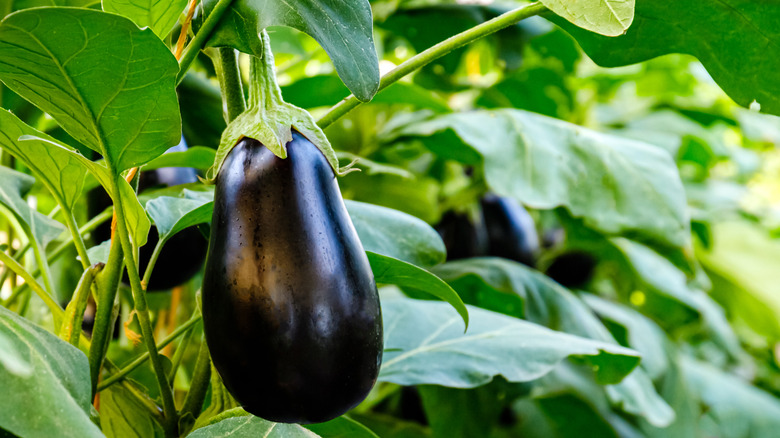
Eggplants, also referred to as aubergines, are famous for their deep glossy purple hue and distinctive oblong shape. This vegetable is a culinary staple in various cuisines for a good reason – it’s delicious (via Medical News Today). Whether enjoying eggplant parmigiana or baba ganoush, eggplants offer numerous health benefits. They are rich in antioxidants, which support heart health, cognitive function, eye health, weight management, and may reduce the risk of cancer. But do all parts of an eggplant provide these benefits? Not quite.
When it comes to consuming eggplants, there’s a particular part you should avoid. Prevention advises against eating the eggplant flowers and leaves due to their toxicity. They contain high levels of solanine, a harmful compound. A 2017 study found that the flower bud of an Iranian eggplant has about 135.63 micrograms of solanine, while the leaves contain 113.29 micrograms. According to Michigan State University, solanine poisoning can lead to symptoms such as vomiting, stomach pain, diarrhea, fever, headaches, slow breathing, and more.
While utilizing every part of vegetables from root to stem is an excellent way to minimize waste, some parts of eggplants are better suited for compost. But what about the eggplant’s skin? Is it safe to consume?
Can you eat the skin of eggplants?

After discarding the flowers and leaves, you might wonder if the skin should also be removed, as it doesn’t always appear on the dining table. Unlike the skins of other vegetables such as sweet potatoes, which are safe to eat, the skin of eggplants is a topic of interest. Research published in Advances of Nutrition highlights that the dietary fiber content in fruits and vegetables increases when the skin is left on. Keeping the peels can enhance the nutritional value of fruits and vegetables, and eggplants are no exception.
Older research in Toxicology shows that the purple skin of an eggplant contains high amounts of nasunin, an anthocyanin. Nasunin aids the body by providing nutrients to cells and eliminating unwanted toxins, according to Medical News Today. It also reduces neuroinflammation, supports blood circulation, and protects brain cell membranes. These benefits may even boost brain function.
The U.S. Department of Agriculture (USDA) states that the peels of young eggplants are safe to consume. However, the skin of older eggplants should be discarded. When selecting aubergines, the Produce for Better Health Foundation recommends choosing ones without discoloration or cracks and that feel heavy. If you’re interested in trying the thick purple skin, ensure it is thoroughly cleaned to remove any bacteria and pesticide residues before eating.




